This Zoom forum thread about being able to story gallery view provides a fascinating look into the many people, from teachers to dancers to actors to game developers, for whom this feature would be a big improvement.
I noticed that, after a recent update, my Zoom did, indeed, allow me to drag people around gallery view; what I didn’t know is that if the host does this, then the order can be deployed for everyone:
Your custom order will be seen only by you, or the host can deploy their custom view to all participants. This order can be released and the order will revert to the default.
Our five year old LG washing machine started rusting last year, under the detergent drawer. Initially I treated this as the start of an inevitable, unstoppable process of decay, but I decided, instead, to see what I could do about nipping the rust in the bud.
I went to Home Hardware and picked up some sandpaper, some painters tape, and a can of glossy white rust paint. I stripped the rusty area down to bare metal, finished cleaning it with vinegar, and then masked the area with the tape and plastic.
The spray paint took a bit of getting used to, and I started off painting much too close, but I quickly learned my lesson. I ended up applying three thin coats, 20 minutes apart. I removed the tape while the paint was still tacky, and then waited 48 hours before reassembling the washer.
The result isn’t gallery quality, but it’s satisfying nonetheless. And the rust is stopped in its tracks. I’m hopeful that I’ll be able to get more than the 7 years we got out of the last washer.
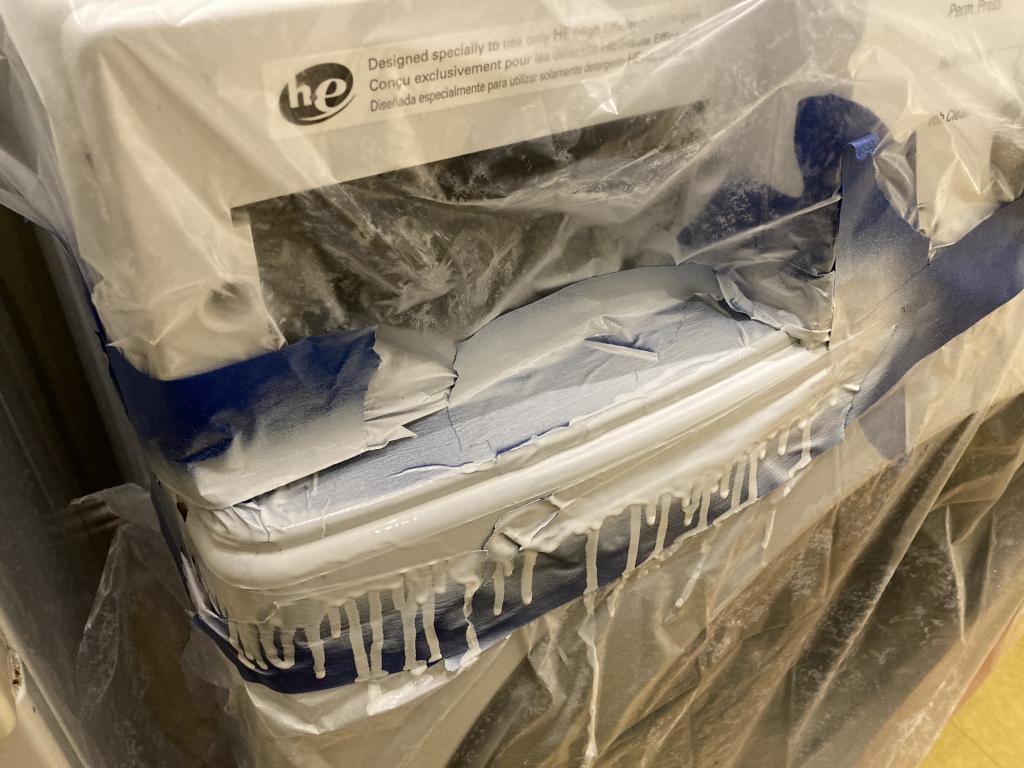 ,
, 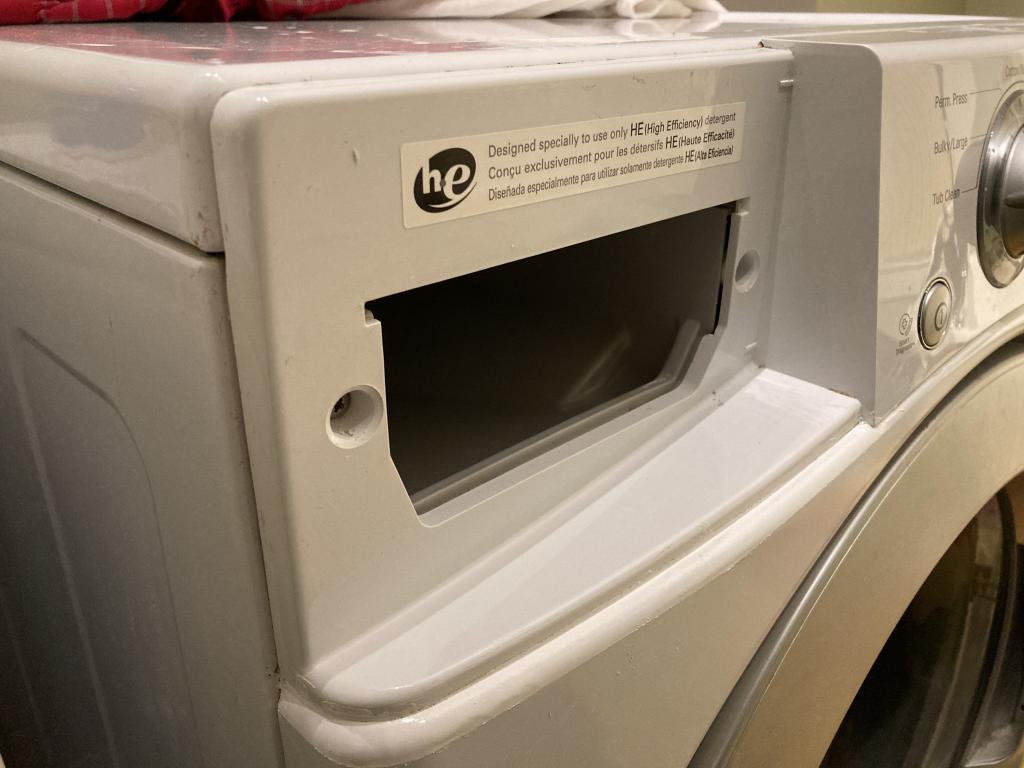 ,
, 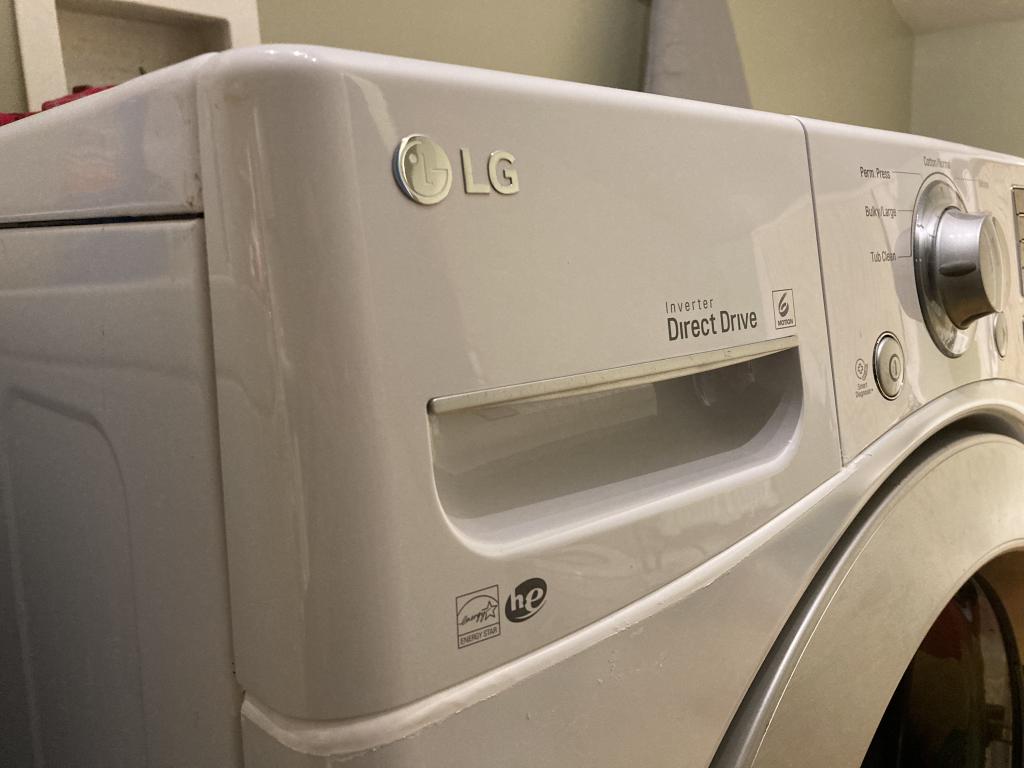
Via my niece A., who is among the most progressive people I know, I have come to learn more about neopronouns.
Culturally I am a member of an interesting generation: those younger than I are completely down with pronoun fluidity, those older have a tendency to couch their acceptance, if acceptance is indeed something they can muster, with “yes, but it makes everything sound so awkward.”
I have some familiarity with progressive language upgrades, as the honorific Ms (as an alternative to Miss or Mrs.) came of age on a timeline that almost exactly mirrored my own:

As such, I’ve been referring to women as Ms for my entire life, and it’s never seemed anything other than natural and proper.
(It’s likely time that Ms gets supplemented with a non-gendered honorific like Mx).
Which is to say: what feels weird on the tongue but just in the heart will soon, with repeated use, become part of how we speak naturally.
All of which leads me to bravx, which appears to have some early tentative use as a non-gendered alternative to the masculine bravo and the feminine brava. This post is a bookmark to come back to in future years to see how that worked out.
Sarah McKenna Brown wrote her 2010 thesis on couchsurfing culture: Travel as Homemaking: The Building of Mobile Intentional Communities.
This thesis is a product of my interest in movement and social transformation. I was drawn to the practice of travel because of my desire to learn about the world and myself and to do this learning in the service of my commitment to social justice. Travel is a profound metaphor for the work of personal and social change; the journey that takes individuals and groups from one ‘place’ to another is a movement that can be physical, mental, or spiritual.
This project is an account of a journey I undertook to participate in and observe the phenomenon known as couchsurfing. The people whom I encountered while couchsurfing were engaged in processes of re-finding, expressing, and creating meanings. In my movement, I am self-reflective, processing what I observe and who I am, then reflecting it to others so that we have the opportunity to see multiple perspectives. Couchsurfers, the Rainbow Family, artists, and activists seek to imagine themselves as creative individuals, knowledge-makers, and relationship-builders. As activists, they believe in a world that will never be fully realized because it is constantly being made.
It’s an interesting read, one that reminds me that it’s the happenstance of travel that I miss most dearly.
I was in Amazon Rekognition this afternoon–their ”image recognition as a service” product–and notice a new “PPE detection” tab. I uploaded a masked photo of myself to try it out and, sure enough, it reported a 99.9% degree of confidence that I was wearing a mask. It also reported only 88.4% that my mask was covering my nose; I have a large nose, and a lot of it was showing, so I don’t blame the robots.
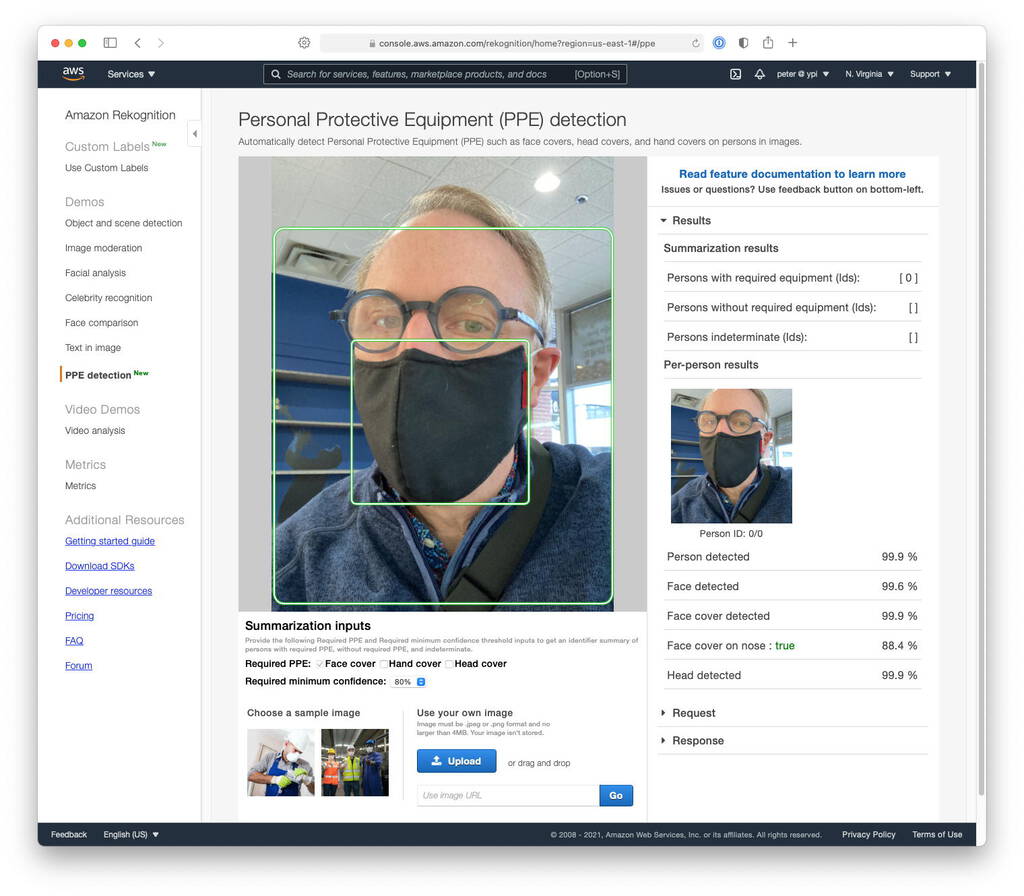
The mask I’m wearing, one I wrote about in October when I purchased it, was a Medium Rare-brand; it served me well until this weekend when the flexible wire nose piece finally snapped in two from metal fatigue. Unable to abide the glasses-fogging the resulted, and with The Cook’s Edge closed on Sundays, rather than replacing it I purchased two new masks, from Bentley, the luggage shop in the Charlottetown Mall of all places. If you can’t trust your luggage supplier to keep you health, who exactly can you trust?
I admire the spelling out of all the possible mat-exchange cadences. Although I prefer fortnightly in place of bi-weekly, as the latter can mean both ”every two weeks” and “twice a week.”
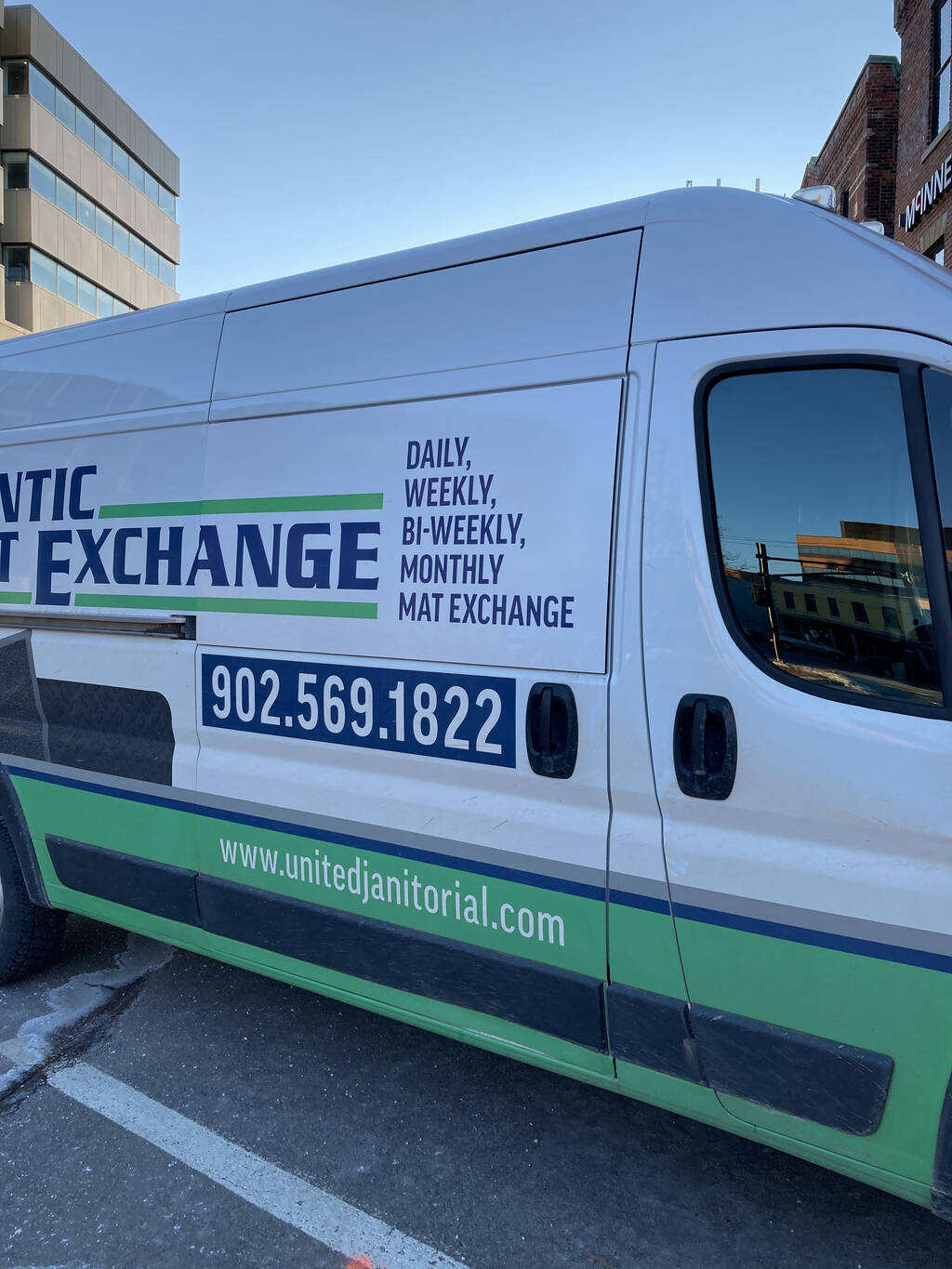
A work in progress, next in the series of COVID-zeitgeist projects that started with TRY in 2020. They say you can’t print light-on-dark with a letterpress and get satisfying results; I’m setting out to discover this for myself, first printing with opaque white and following on with overprinting in yellow. Once I was done with the white, I noticed this glimpse of the GLIMPSE on the roller.
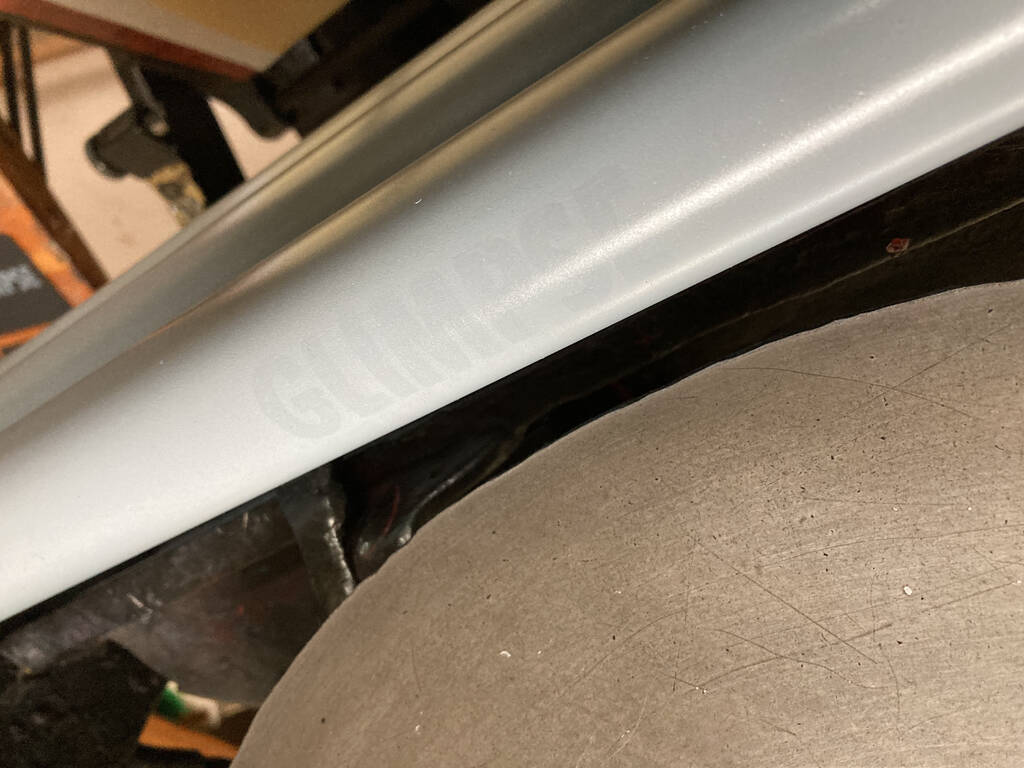
An episode of the The Widow We Do Now? podcast in August featured widower Treagan White, who talked about the life and death of his wife Kim White through cancer, and his life since. Listening to it over the last week — it’s almost an hour and a half long — I had a lot of “wow, you think that too!?” moments.
One of the things that confounds Oliver is making choices, and when you sit back and think about the number of things in everyday life that are choices—what clothes to wear? what to have for breakfast? lunch? supper? multiple choice tests, what’s your favourite? questions—it’s a tsunami.
The tsunami crested before Christmas when motherless Oliver was faced, for the first time, with buying Christmas gifts all by himself.
One day in late November I came home to find that Oliver had uncorked a prepaid Visa card he’d be given for for his 20th birthday. I asked him what he’d used it for, and he was cagey in that “don’t ask because it involves you” kind of way. He eventually admitted that he’d used it on a website that would take over the process of buying gifts.
Alarm bells immediately went off inside my head: a website that collects credit numbers and the names, addresses, and predilections of friends and family? That had danger written all over it.
While Oliver’s Visa was only worth $25, so his financial liability wasn’t great, his emotional liability was on the line, and so, treading the murky line between privacy invasion and duty of care that parents know well, I set off to find out everything I could about joyful.gifts.
Initial signs weren’t good: there was no physical address or location listed on the site, no social media links to follow, the domain name registration hid the contact information, and an initial email inquiry went seemingly unanswered. I feared the worst, and consulted brother Mike to seek confirmation of my paranoia.
And then a surprising thing happened: I got an email back from Mariam, apologizing for a tardy reply:
Yes! We are real :) We were so excited when your son found us. The internet is a huge place and it’s hard to stand out and compete against the Googles and Amazons of the world.
We exchanged a few more emails, and I learned they’re a small family startup near Bear, Delaware. Based on my experience, they added links to social media on their site, and I was able to follow those to the point where I was satisfied enough that they were on the up and up. So I handed over my credit card and waited for joyful.gifts to save Oliver’s Christmas.
And, as it turned out, they did exactly what they said they were going to do: they sent custom-tailored gifts to everyone Oliver specified, with a per-gift limit of $25 and a per-gift fee of $4.99, shipping included. The gifts arrived on time, with a gift card from Oliver, wrapped nicely in fabric bags. My mother received a music box, my brother Johnny a perpetual motion machine, and I received a USB-powered digital clock.
Oliver, miracle of miracles, pulled a Kobayashi Maru on Christmas.
Today in the mail I got a lovely handwritten thank you card from Jonathan and Mariam at joyful.gifts, and they asked me help spread the word about their enterprise; I’m happy to do so. If you too are challenged by choice (or time, or, during COVID, ability to shop), Oliver’s experience suggests that joyful.gifts might be just the site for you.


 I am
I am